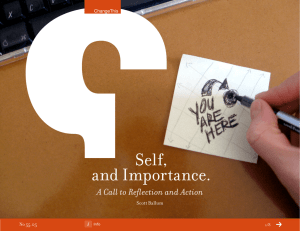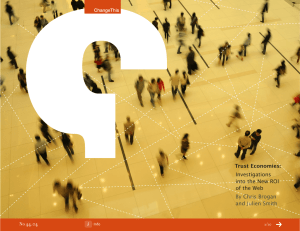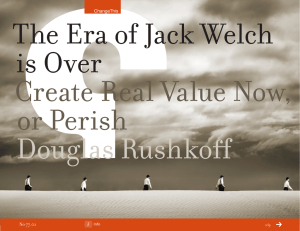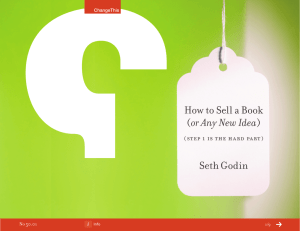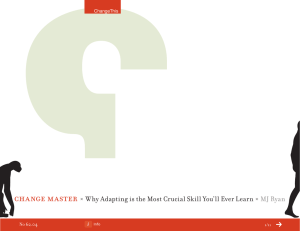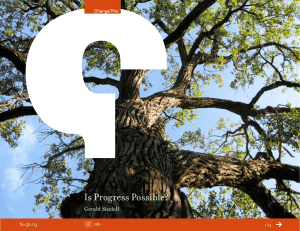The Laws of the Econosphere Craig Thomas 67.04 No
advertisement
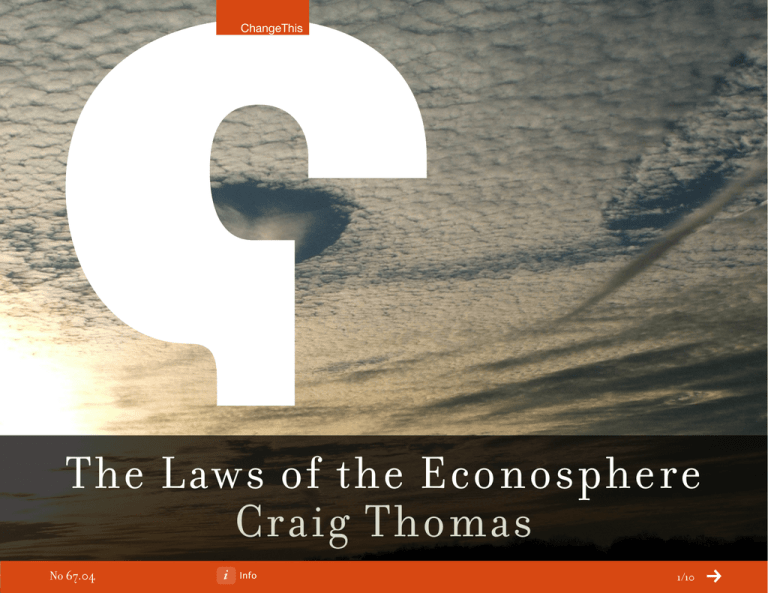
ChangeThis The Laws of the Econosphere Craig Thomas No 67.04 Info 1/10 ChangeThis Healthy Businesses and Productive Lives Require a Healthy Econosphere If we save our environment, we save ourselves. That makes sense, right? That sentiment is nothing new. Clean water, clean air, sustainable development, etc. means that the planet will sustain this generation, and the next, and the next. It makes good business sense to look after the world. Healthy environment, healthy clients and healthy workers are ingredients for healthy profits. So, let’s save the environment. Let’s make sure that we preserve market pricing. Let’s work to purge markets of polluting public policy that diverts capital and redistributes income. Let’s make sure that the market is fully able to reward individual contributions, and conversely punish unproductive activity. Are you with me? No? Maybe I should backtrack. The environment that I am talking about is our “Econosphere.” Our atmosphere provides us with oxygen to breath, our biosphere provides us with the means to nurture and sustain ourselves, and it is our Econosphere, our natural market economy, that provides us with the signals that each of us need to direct our efforts to be as productive as possible. Save the Econosphere, and we save ourselves. It is our Econosphere, our natural market economy, that provides us with the signals that each of us need to direct our efforts to be as productive as possible. No 67.04 Info 2/10 ChangeThis What is the Econosphere? It is the world created by and governing human decision making, and it is our home. It provides for us and nurtures us. It reacts to and informs our every interaction and, if we understand it, allows us to optimize the use of our life spans moment by moment. This environment is not, however, one made of oxygen and hydrogen, oil and steel, high mountains and low plains. Rather, the Econosphere is our social environment, where we work, live, raise our families, and govern ourselves. We need to start thinking about the economy as a holistic, natural system. To those who are inclined to see it, it is breathtaking choreography on a global scale with billions of performers, each one in character, playing his or her unique role so that the entire ensemble shines. The Econosphere provides for us, yet it is also of us. Simple rules govern our Econosphere. Each of us is a utility maximizer; we do what we can each day to maximize happiness through the pursuit of avocations and relationships. To obtain food and shelter, we trade our time and abilities to produce goods and services valued by others. Market prices tell us what those products and services are, enabling us to help complete strangers half a world away maximize their own happiness as they help us. In a land of infinite demand and finite resources, it is the Econosphere that provides the tools to do this efficiently and successfully. Of course, many efforts run off the rails, but it is not the Econosphere that needs fixing. Imperfect information is the usual culprit: When we overbuild, overinvest or over-borrow, it is because we did not have the right information. For example, why would home buyers take on unaffordable loans? Maybe because they were told houses never lose value. Why would investors buy securities built of such poorly conceived loans? Maybe they believed mortgages are the last things Americans default on. Now, because of the bad information that led to such decisions, we have to dig out of an economic hole. And to do that, a healthy Econosphere is essential. No 67.04 Info 3/10 ChangeThis We need market prices to show us what the world does and doesn’t value. We need enterprises that are no longer viable to fail quickly and completely, no matter how big they are—no firm is so big as to hold sway over the Econosphere. We need firms that can make better products or manage balance sheets more intelligently to be rewarded for doing the right thing. We need prices to fall until demand balances supply. We must have lending rates that reflect real risks. Perhaps most important, we need laws and regulations that are clear, fair and predictable. Uncertain rules drive up the cost of borrowing, investing or hiring. Yet just when we need a blooming, robust Econosphere most, our economic ecology is being manhandled by those who would re-engineer it to further their own narrow interests. In the process, the latter-day conquerors of nature threaten to pave over markets and fill in the wetlands of trade. Our metaphorical Cuyahoga River is aflame. As we have gone green toward the natural ecosystem, we need a similar attitude adjustment about the Econosphere. Just as the tree-huggers of past decades spearheaded the environmental movement, we need modern-day “price-huggers,” people who wish to protect the integrity of market pricing, to stand in front of those planning to bulldoze what’s left of our benevolent, natural market economy. The Econosphere is our social environment, where we work, live, raise our families, and govern ourselves. No 67.04 Info 4/10 ChangeThis Four simple laws allow the Econosphere to Function as a Sustainable System. 1. Law of Growth | Each new person brings additional new wealth to the world. The essential raw material that creates value and wealth in our economy is the human potential. We have what we are born with, and what we make with that potential through education, training, collaboration and experience. The consumption of this potential, via trading precious leisure time for productive time is the fountain from which our economy spills forth. We’re born with what will sustain us, and that is why our Econosphere is a sustainable system. We need to start thinking about the economy as a holistic, natural system. 2. Law of Information | No matter the problem, better information is always part of the solution. The market is perfect; it is information that is imperfect. Recessions happen because we acted on poor information. For example, house prices will rise forever, Americans always pay their mortgages, etc… The problem in the housing bust was that our information was incorrect, not that our market economy mediates the distribution of capital. Unfortunately, policy responses to recessions often hinge on “fixing” the Econosphere, as opposed to improving the information. You can’t improve the Econosphere any more than you can improve upon nature. We were one high school-level personal finance course away from avoiding this entire recession. We should be helping individuals acquire the information to make the best decisions possible; unfortunately, we are trying to warp incentives within the Econosphere and substitute the wisdom of billions of individuals with the judgment of a small group of policymakers. No 67.04 Info 5/10 ChangeThis 3. Law of Sustainability | Bounty comes from people and nothing else. The animating force of the Econosphere is humanity. We worry a great deal about exhausting our physical raw materials, but the only raw material that really matters is us, humanity. For instance, oil is worthless in the ground; it is only valuable if we bring it to the surface, refine it, and use it for things like transportation or to heat our homes. All of the value in a barrel of oil comes from the human elements: demanding it as a component of our daily activities, and our refining it into products. It is only people that matter. As long as we have people, our Econosphere is sustainable. Of course you can argue that if we exhaust, say, clean water, we will exhaust our supply of people, as well. True. Fortunately, the Econosphere provides incentives such that we consume less of and produce more of those things that are scarce and of most value to us. 4. Law of Plenty | The Econosphere never takes from one to give to another. Because all value spills forth from our trading our precious leisure time for time in the market producing goods and services valued by our fellow men and women, we will never have what is cynically referred to as a “zero sum game.” A zero sum game is a system where there is a winner and a loser. If one acquires, say, one dollar, that means that someone else has lost one dollar. Hogwash! We do not have a fixed amount of wealth in our Econosphere. Rather, each of us creates wealth each day by using our abilities to produce goods and services to trade for the fruit of others’ abilities. Sure, some peoples’ abilities are more valuable than others, but that is not a zero sum game. Quite the contrary. The Econosphere if a benevolent system, where we can take our one raw material, our potential, and use that potential in the production of goods and services valued by others. Humanity is its own renewable resource, and the Econosphere guides us to get the maximum value from that key resource. No 67.04 Info 6/10 ChangeThis What Is Policy’s Role in the Econosphere? Governments are a bit of an alien force within the Econosphere. They must be desirable, otherwise we would neither create nor support them, but they are not entirely governed by the same forces that govern individuals and firms. Moreover, they tend to outgrow their original mandate, which is to protect property rights. If you boil down government to its marrow, it is there to make sure that someone does not stroll across your lawn, conk you on the head, and claim your property as his or hers. Certainly, you can say, I don’t need government to do that. I can take care of my own stuff! Or at least, I can hire someone to take care of it. And yes, you could. But, if everyone were to hire their own security force to protect their own property rights, it would be certain that differing ideas of property rights would flourish simultaneously and create ongoing conflict, such as in, say, Somalia, Afghanistan, or in the Godfather movies. Thus, developed societies all eventually see the value of just one set of property rights and agree on one unified body to maintain that code of law, and that, my friends, is your government! Now, you may say, “My government does a lot more than that.” You might point out that your government sets emission standards for autos. Yes, but I can counter that those emission standards are there to protect the quality of the air that is breathed as a public good shared among us all. The government is protecting your access to clean air; it is protecting your property rights. You might point out that your government sets safety standards for food. Well, yes, but those standards keep companies from taking your life via harmful ingredients or poor quality; and as we know from our study of the Econosphere, your life is your most valuable property. You might point out that your government sets education standards. Well, in that case, it might be a stretch, but you might conclude that someone with a high school diploma is less likely to crawl through your window at night and steal your television set, or is less likely to cause damage to public property, which costs everyone both in terms of loss of use of that property and in paying the cost of fixing the damage. No 67.04 Info 7/10 ChangeThis What of our expensive national defense? Well, that keeps foreign aggressors from coming in and taking all our stuff. You see, this is what government does. It upholds laws that detail what is theft and what is not. All the high-minded rhetoric boils down to that basic fact. This is government’s useful purpose. As you go out there into the Econosphere to create value and support yourself and your family, the government is there to make sure that you can keep the rewards of your labor. Unfortunately, the government often tries to do more than just that. And generally, I might add, that as its well intended programs stray away from this central purpose of protecting property rights, these programs become difficult to pass or maintain support for. There is a reason why legislation favoring transfers of wealth from one group to another is not very successful in the long run. They have nothing to do with protecting property; they have more to do with the redistribution of property. Subsequently, there is a hint of theft in the policies that cause some to rightfully rail against them. Moreover, such policies run against the nature on the Econosphere itself. These public efforts on our behalf make us not only run less efficiently, but also ultimately lead to all kinds of unintended consequences. For instance, government bans on the production or importation of some good can create black markets for the banned item. Those involved in these informal markets operate outside the bounds of accepted law or codes of conduct such that these shadowy elements are more likely to commit crimes and abuses against one’s property and one’s person. There are many times that society stops to ponder what is worse, the banned item or the resulting crime that can occur as a consequence of said item finding its way to market via criminal elements. No 67.04 Info 8/10 ChangeThis Why is there no Economy Day? We are a part of an immense, sustainable social ecosystem that provides us all the incentives we need to best utilize our single, important raw material: Our own inborn potential and ability. We deplete this raw material over the course of our lives for the betterment of ourselves and those for whom we care, during which time we produce the goods and services that better all mankind. In the same way that our physical environment provides food, air, water, warmth, and more for an array of living organisms so that it is a self-sustaining system, our social ecosystem, our economy is the counterpart to the physical environment providing the incentives that we need to successfully interact with one another and prosper. Mankind has wrought great harm onto our physical environment over the centuries. And now that we are, perhaps, a bit more enlightened as to our effect on the natural balance of things, we aim to repair those problems that we have created and avoid making those same mistakes in the future. The Econosphere is in much the same shape as the physical environment, but we have yet to become fully enlightened as to the ramifications of our actions. Because this social environment is more difficult to see and monitor, and because we have not yet trained ourselves entirely to feel, appreciate, and accept its role in our lives, we have not yet had our environmental epiphany as it pertains to our economy—our Econosphere. There is an Earth Day, but there is no Economy Day! It is my hope that someday, that is not the case. No 67.04 Info 9/10 ChangeThis info About the Author Craig Thomas is a veteran private-sector economist, working today as Senior Economist at one of the largest financial services firms in the United States. Among his previous posts, he was Director of Research for Citi Property Investors, Citigroup’s private equity real estate arm, developing information that drives billions of dollars of investment decisions. Specializing in regional, macro, and real estate economics, he has modeled and analyzed myriad markets and asset classes, presenting his findings worldwide. His economics columns quickly gathered an avid readership of more than 30,000 economists and noneconomists who appreciate his unique ability to explain complex theory in a simple and entertaining way. send this Pass along a copy of this manifesto to others. buy the book Get more details or buy a copy of Craig Thomas’s The Econosphere. Subscribe Sign up for our free e-newsletter to learn about our latest manifestos as soon as they are available. Born on date This document was created onFebruary 10, 2010 and is based on the best information available at that time. Check here for updates. ABOUT CHANGETHIS Copyright info WHAT YOU CAN DO ChangeThis is a vehicle, not a publisher. We make it easy for big ideas to spread. While the authors we work with are responsible for their own work, they don’t necessarily agree with everything available in ChangeThis format. But you knew that already. The copyright of this work belongs to the author, who is solely responsible for the content. You are given the unlimited right to print this manifesto and to distribute it electronically (via email, your website, or any other means). You can print out pages and put them in your favorite coffee shop’s windows or your doctor’s waiting room. You can transcribe the author’s words onto the sidewalk, or you can hand out copies to everyone you meet. You may not alter this manifesto in any way, though, and you may not charge for it. ChangeThis is supported by the love and tender care of 800-CEO-READ. Visit us at 800-CEO-READ or at our daily blog. No 67.04 Info This work is licensed under the Creative Commons Attribution-NonCommercialNoDerivs License. To view a copy of this license, visit Creative Commons or send a letter to Creative Commons, 559 Nathan Abbott Way, Stanford, California 94305, USA. Cover photo from morgueFile. 10/10

